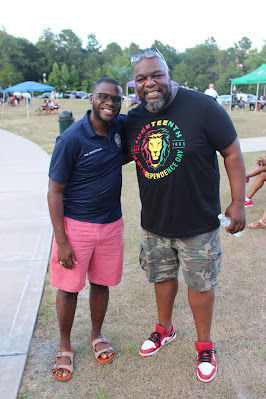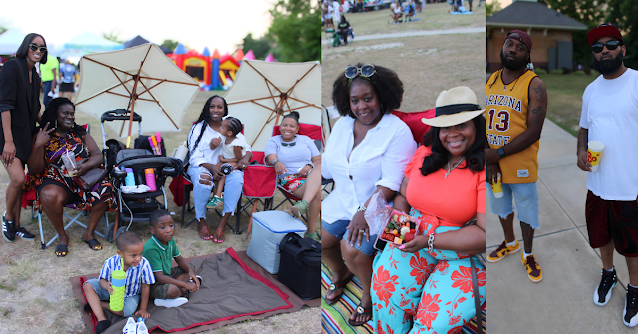Continuing the Legacy of Juneteenth Across The Midlands
 |
| Juneteenth Celebration Harriet Barber House Hopkins, S.C. Photo by: JavarJuarez©2024 |
By Javar Juarez
South Carolina (CUBNSC)- The legacy of Juneteenth continues to resonate throughout communities across South Carolina this year, even in the face of an extremist conservative agenda against Black history and Black culture. This Juneteenth, a holiday with a long and rich history that has recently gained national esteem and recognition, has become a well-celebrated and meaningful experience for younger Black Americans. Officially known as Juneteenth National Independence Day, it is a federal holiday in the United States, celebrated annually on June 19 to commemorate the end of slavery. However, it has come under attack as conservatives seek to dismantle its legacy and work to keep the long and rich history of Juneteenth out of classrooms and national memory.
In South Carolina, the holiday is still not officially recognized. Despite this, online perceptions and comments under social media posts from African Americans across the state show significant support and national pride for Juneteenth. Many white conservatives have rallied against it as not being an official holiday, promoting an anti-Black narrative against its expansion. Nevertheless, this has not stopped African American people in South Carolina, as this Juneteenth holds special significance in the face of these attacks.
Many Americans believe that slavery in the United States ended when President Abraham Lincoln signed the Emancipation Proclamation on January 1, 1863. This document declared that “all persons held as slaves” within the rebellious states “are, and henceforward shall be free.” However, the path to realizing freedom was much more complicated.
Fearing the loss of support from Americans loyal to the Union, Lincoln’s Proclamation did not emancipate enslaved people in certain parishes in Louisiana, nor in the states of Maryland, Missouri, Tennessee, and West Virginia, though each of those states abolished slavery before the war’s end. News of the Proclamation did not reach all enslaved people simultaneously; some African Americans first heard about emancipation months after the war ended in April 1865.
 |
| The Galveston Daily News June 19, 1865 |
Although numerous African Americans celebrated on the first Juneteenth, many others faced uncertainty about the true implications of their newfound freedom. The road to emancipation was fraught with challenges, much like the path that followed. Juneteenth, as the oldest national holiday commemorating emancipation in the United States, symbolizes our nation's lengthy and often difficult journey to uphold its foundational principles of life, liberty, and the pursuit of happiness.
Juneteenth is not only a celebration but also a day to honor the ancestors who perished while enslaved, shackled, and transported across the Atlantic Ocean. Many did not survive the harrowing voyage and were tragically cast into the sea.
Communities all across the state have gotten together to organize Juneteenth celebrations to a degree which has not been seen before. The CUBN was present at four such celebrations, including the Juneteenth Freedom Festival or the 8th Annual Juneteenth Festival Freedom Festival that kicked off at the Dutch Square Mall in Columbia, SC. The festival featured vendors serving up authentic food and handmade goods, a main stage showcasing local and national artists, musicians, and bands. Despite the heat, participants were not disappointed in all that the festival had to offer.
 |
| Crowds set up for the 8th Juneteenth Freedom Festival at the Dutch Square Mall Photo by: JavarJuarez©2024 |
Juneteenth At Historic Harriet Barber House
Juneteenth at the Harriet Barber House was quintessential South Carolina, featuring fried fish and delectable treats on the grounds of the historic Harriet Barber House in Hopkins, SC. It also featured a stage of prominent artists and nationally recognized entertainers.
 |
| Juneteenth at Barber House Hopkins, S.C. Photo by: JavarJuarez©2024 |
The Barber House, according to family tradition, was constructed ca. 1880 and expanded in the early twentieth century. It is significant for its association during the late nineteenth century with the South Carolina Land Commission, a unique attempt by a southern state to give freedmen the opportunity to own land. Although many freedmen eventually lost their land, the land on which the Barber House is located has remained in the same family since 1872. The numerous additions made to the house in the early twentieth century reflect the growing prosperity of this black family in the years after the Civil WarIn 1872 Samuel Barber, a former slave, purchased lot number 35, which contained forty-two and one-half acres of the Hopkins Tract, one of six tracts in Lower Richland County purchased by the South Carolina Land Commission for redistribution.
The celebration was a spiritual moment, connecting to the long, formidable history of African Americans in the deep and rural South. The African dance and drumline was an enriching moment that opened the way for the performances that were to come. It signaled to the ancestors that we are here, that we see you, that we feel you, and that we honor you.
 |
| Attendees of the Hopkins Juneteenth Celebration at Barber House Photo by: JavarJuarez©2024 |
Juneteenth At Doko Manor
The Juneteenth celebration in Blythewood, SC, truly showcased the diversity within the African American community, highlighting that we are not a monolith. Each of us has a unique and personal style, and this celebration had its own laid-back flair. Blythewood, South Carolina, has welcomed a new mayor, Sloan Jarvis Griffin III, who showed up in full support for the celebration (not pictured). Also present were Richland County Councilman Derek Pugh and Kambrell Garvin, representative for House District 77.
The music, laughter, and the sight of people relaxing on the lawn with cigars from Blythewood Cigars and Wine, a Black female-led business, created a lively backdrop. Children played and ran around freely at Doko Meadows Park a 25-acre master planned park surrounding the Town of Blythewood’s historic town hall. The park currently includes a playground area with restrooms and picnic tables, walking trails with benches, a lake, and an athletic field.
 |
| S.C. House Rep. Kambrell Garvin and Richland County Councilman Derek Pugh Photo by: JavarJuarez©2024 |
This Juneteenth was very special despite all the ways that our Black history continues to come under fire even today in the South Carolina State House. These celebrations represent to us a meaningful engagement with each other to show unity, promise, power, and national pride.
 |
| Blythewood Juneteenth Celebration Photo by: JavarJuarez©2024 |
Juneteenth and Black Wall Street
 |
| 7Sunday Presents Juneteenth Film Festival Extravaganza at Columbia Museum of Art Photo by: JavarJuarez©2024 |
 |
| left to right. Tina Herbert, Dr. Bobby Donaldson, Diane Sumpter "Columbia's Black Wall Street" premier. Photo by: JavarJuarez©2024 |
Bridging the racial wealth gap, challenging racist structures, and working toward economic justice is not easy, but it is the work set before us if we have any hope of making the promise of freedom a reality. We should pause to celebrate that freedom on Juneteenth, and then work tirelessly the rest of the year to make it so.
Organizers like Jamal Bradley, Co-founder of the Juneteenth Freedom Festival in Columbia, S.C.—one of the most popular Juneteenth events in South Carolina—continue to push for the state to officially recognize the holiday. Jamal Bradley has initiated a petition on Change.org to make Juneteenth a state-recognized holiday. You can join the effort and sign the petition by visiting JUNETEENTH PETITION
 |
| Jamal Bradley Co-Founder of the Juneteenth Freedom Festival Columbia, S.C. Photo by: JavarJuarez©2024 |
Javar Juarez is the senior director of the CUBN, an American Businessman, Writer, Community Organizer, Entertainer and Political Consultant. follow us on X Visit our Network Homepage at: CUBNSC.COM
 |
| Javar Juarez at 7Sunday Juneteenth Extravaganza Photo by: JavarJuarez©2024 |
The Columbia Urban Broadcast Network, an independent Black-owned media company, needs your support to continue bringing our stories and issues to the forefront in South Carolina and across America. Please consider donating to our cause via corporate CashApp: $CUBNSC
Thank you for your continued support!

Comments
Post a Comment